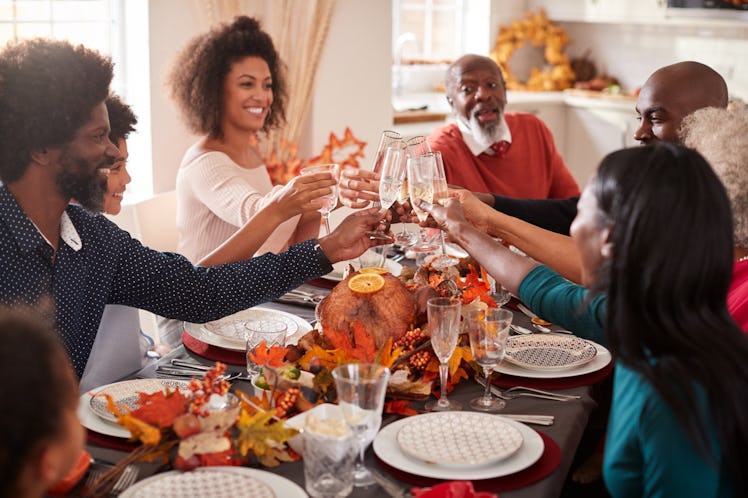Thanksgiving is practically synonymous with “family time.” However, as you prepare to ring in the holiday during a pandemic, you might be wondering if it’s safe to visit family for Thanksgiving 2020. Unfortunately, experts are cautioning against traditional Thanksgiving celebrations, especially since holiday travel could also lead to a spike in cases. As you plan for the holiday, here’s what you should consider.
First, if you need to travel to see family, you might want to reconsider. According to holiday guidelines from the U.S. Centers for Disease Control & Prevention (CDC) as of Nov. 11, traveling puts you and others at a higher risk of getting and spreading COVID-19, and coronavirus numbers are currently spiking in the United States as of Nov. 18. The CDC states the best way to stay safe is to stay home. You can keep up with current holiday guidance on the CDC website.
If you do get together with family, it’s not risk-free. There is no safe way to celebrate Thanksgiving in-person, says Dr. John Swartzberg, M.D., F.A.C.P., clinical professor emeritus of infectious diseases and vaccinology at Berkeley Public Health. Dr. Swartzberg tells Elite Daily, "risk can only be mitigated."
Rachael Piltch-Loeb, Ph.D., preparedness fellow at Harvard University's T.H. Chan School of Public Health, tells Elite Daily there is a continuum of how risky a Thanksgiving gathering can be based on a number of factors. "The 'safest' people to spend Thanksgiving with are those that you have already been seeing in your own 'pod' or bubble of comfort," she says.
"If [you’re] seeing others at Thanksgiving, you are accepting some level of risk of transmission, and that is a decision many people are comfortable with," Piltch-Loeb explains.
According to the CDC as of Nov. 11, celebrating with those in your immediate household or virtually are the safest options. Having an outdoor gathering with friends and family who live in your community carries a moderate risk, while attending any sort of indoor gathering comes with the highest risk.
If you have a loved one who's at higher risk for complications from the virus, like grandparents or immunocompromised relatives, you will also want to agree upon some extra precautionary measures once you are around them, such as social distancing, wearing a mask, and holding the celebration outdoors if possible. The CDC also recommends everyone get their flu shot before attending any kind of Thanksgiving celebration.
Keri Althoff, Ph.D., associate professor in the Department of Epidemiology at the Johns Hopkins Bloomberg School of Public Health, spoke about the holiday risks in a Nov. 12 Bloomberg School webinar. Althoff recommends a 14-day quarantine before seeing family, and she says you should have a virtual meeting prior to the holiday to discuss expectations and ground rules.
If you're considering getting yourself tested for COVID-19 ahead of time for peace of mind, keep in mind that a negative test does not guarantee you do not have COVID. Piltch-Loeb warns this is because of high rates of false negative results, which is when you are actually positive but the virus was not detectable when you took the test. If you're traveling, Piltch-Loeb does recommend quarantining and testing before and after your trip.
Once you're with your family, you can further reduce risk by ideally holding your Thanksgiving gathering outside, or if that's not possible, increase ventilation by opening windows inside. You should also wear face masks when you're not eating or drinking and practicing social distancing.
"Consider organizing the tables by people that live together. For example, people from one household are in closest proximity to each other,” Piltch-Loeb suggests. You can also assign seats ahead of time to avoid big clusters of people milling about. The CDC also suggests shortening the time of a regular gathering, since "being within 6 feet of someone who has COVID-19 for a cumulative total of 15 minutes or more greatly increases the risk of becoming sick and requires a 14-day quarantine."
When it comes to transportation, Piltch-Loeb recommends personal vehicles as the safest option as you'll not be coming into contact with others during your drive. Althoff says while airplanes themselves aren't as high-risk, high-touch surfaces in airports and airport shuttles as well as crowds can be an issue, especially during busy periods of travel.
As always, do not travel if you feel unwell, if you are awaiting COVID-19 test results, or if you're in quarantine after a close contact with someone who has had COVID-19. You should also review your state's policies for quarantining for visitors from other states, and also know your home state's policies on quarantining for your return, as well as the policies of your employer, your daycare provider, or your school if applicable.
"Remember the celebration may be just one single event, but it's actually the 14 days before you're bringing all those exposures with you to that event," Althoff says, adding "quarantine and isolation are important key tools in combating this epidemic."
Althoff adds you should also be prepared for the possibility that, despite all your precautions, someone does contract the virus: "If someone does get symptomatic after the event, there should be a plan in place before the event for who will be called and whose job it will be to call the other guests to let them know what has happened."
If you think you’re showing symptoms of coronavirus, which include fever, shortness of breath, and cough, call your doctor before going to get tested. If you’re anxious about the virus’s spread in your community, visit the CDC for up-to-date information and resources, or seek out mental health support. You can find all of Elite Daily's coverage of coronavirus here.
Sources cited:
Dr. John Swartzberg, M.D., F.A.C.P., clinical professor emeritus of infectious diseases and vaccinology at Berkeley Public Health
Keri Althoff, Ph.D., associate professor in the Department of Epidemiology at the Johns Hopkins Bloomberg School of Public Health
Rachael Piltch-Loeb, Ph.D., preparedness fellow at Harvard University's T.H. Chan School of Public Health
